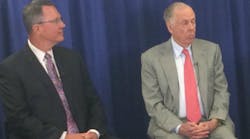DALLAS. Despite current low prices for oil, natural gas will continue to provide a cost advantage for major energy consumers like heavy-duty truck fleets, according to T. Boone Pickens, chairman and CEO of BP Capital and a major proponent of and investor in domestic natural gas since 1988.
If natural gas prices were to double from current levels, it would only raise the price to end users $0.37 per diesel gallon equivalent (DGE), he said during the opening session of the 2015 ACT Expo and Conference. “Oil prices have dropped 50% from $100/barrel to $50/barrel, but since 1980 I’ve seen six of these [50%] collapse of oil prices and I promise you it’ll be back up around $70 by the end of the year and back up to $90 by the end of next year,” Pickens said. Oil demand is now up and supply has dropped as producers have stepped back due to the low prices, which “will bring [oil] prices up pretty quickly,” he said.
While Pickens sees natural gas prices increasing from current low levels, he believes when that happens oil will rise to $150/barrel, maintaining the natural gas price advantage “for a long time.”
Looking out five to 10 years, “things get a bit fuzzier,” Pickens said, “but I think we’re looking at $100 plus [per barrel] forever after.”
Seconding Pickens’ bullish outlook on natural gas prices was Gary Thomas, president and exec. dir. of the Dallas Area Rapid Transit. In 2012 the authority converted its entire 650 bus fleet to natural gas, which has resulted in fuel savings of $12 million a year, he said during the ACT Expo session. Payback for investment in four NG fueling facilities and for the additional cost of the NG-powered vehicles was 3.75 years, according to Thomas.
DART operates with a 20-year financial plan looking at anticipated revenues and costs, Thomas explained. With a 12-year life cycle on its buses, that plan anticipates a second cycle of NG bus replacements based on their fuel cost advantages, he said.
As a public agency, DART is not only concerned with sustainability and public welfare benefits from alternative fuel use, but “also that we be good stewards of those public dollars,” Thomas said.



